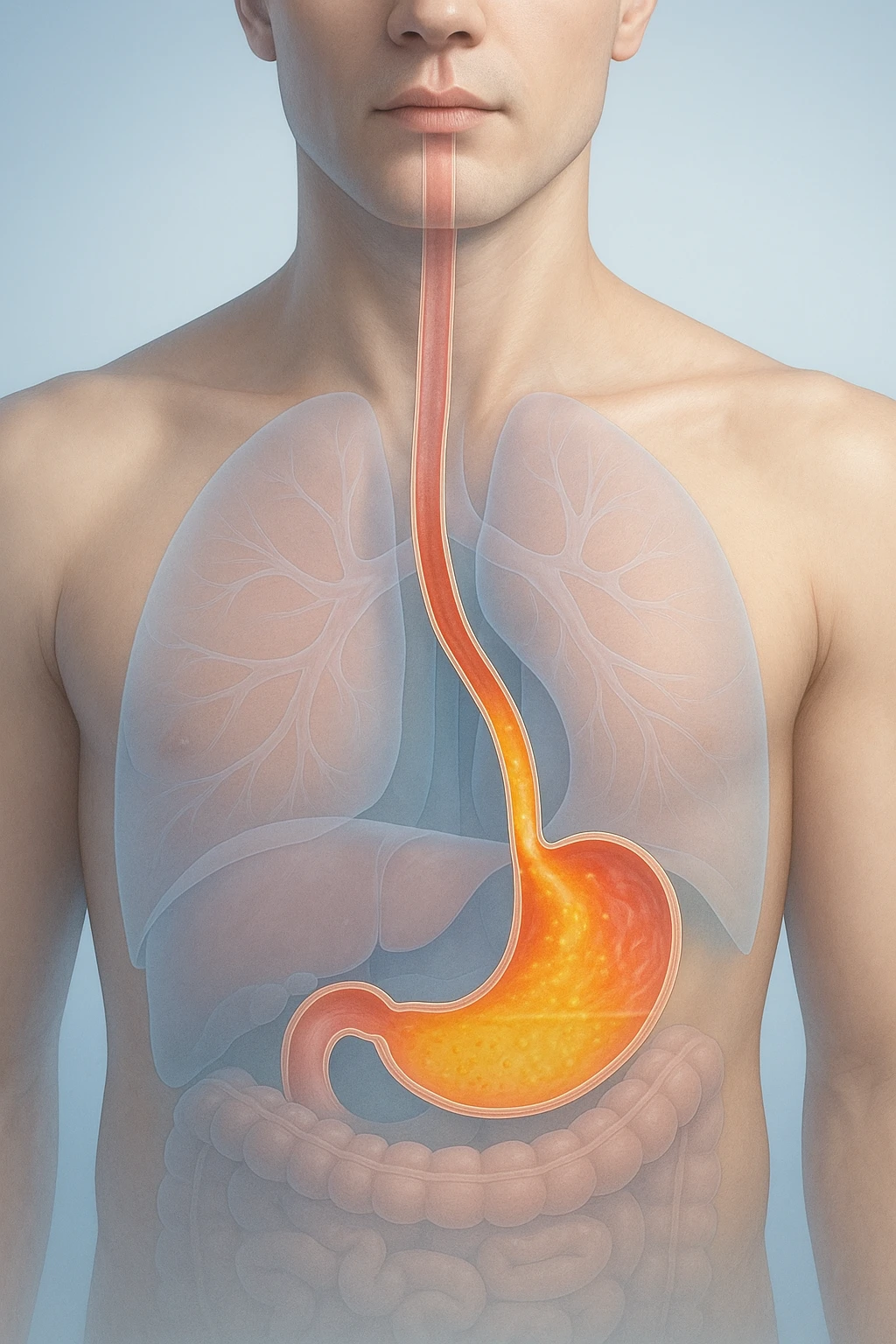Causes and Symptoms of Stomach Heaviness: What You Should Know
Stomach Heaviness: Overview and Causes
Stomach heaviness is a common clinical symptom characterized by a sensation of fullness or discomfort in the abdomen. It is often associated with chronic abdominal bloating and distension, which are frequently reported by patients. These symptoms can significantly impact daily functioning and quality of life. The causes of stomach heaviness are multifactorial, encompassing a wide range of gastrointestinal and psychological factors.
Common Causes of Stomach Heaviness:
- Gastrointestinal motility disorders
- Gut microbiota imbalances
- Psychological factors, such as stress and anxiety
In many cases, stomach heaviness results from disruptions in normal digestive processes, such as gastrointestinal motility disorders or imbalances in gut microbiota. Psychological factors, including stress and anxiety, can further contribute to or exacerbate the sensation of heaviness. Given the complexity of its causes, a comprehensive approach to diagnosis and management is essential to effectively address this condition and improve patient outcomes.
Causes of Stomach Heaviness
Gastrointestinal Motility Disorders
Gastrointestinal motility disorders, such as gastroparesis, can significantly contribute to stomach heaviness. These conditions slow the movement of food through the digestive tract, leading to delayed gastric emptying. As food remains in the stomach longer than normal, it can cause a sensation of fullness and discomfort. This delayed gastric emptying is often accompanied by bloating, a common symptom that further exacerbates the feeling of heaviness in the stomach.
Gut Microbiota Imbalance and SIBO
Imbalances in gut microbiota, including conditions like small intestinal bacterial overgrowth (SIBO), are key contributors to bloating and abdominal discomfort. SIBO occurs when there is an abnormal increase in the number of bacteria in the small intestine. These excess bacteria can ferment undigested food, producing gas that causes bloating and discomfort. Altered gut microbiota can also lead to inflammation and impaired digestion, further compounding the sensation of heaviness in the stomach.
Functional Dyspepsia and Visceral Hypersensitivity
Functional dyspepsia is a common condition characterized by upper abdominal discomfort, often accompanied by bloating. While the exact cause remains unclear, it is thought to involve abnormal sensitivity of the stomach lining (visceral hypersensitivity). This hypersensitivity makes the stomach more sensitive to normal digestive processes, leading to the perception of heaviness, fullness, and discomfort. The chronic nature of functional dyspepsia means that these symptoms can have a significant impact on a patient’s daily life and well-being.
Diagnosis of Stomach Heaviness
Comprehensive Evaluation
The diagnostic process for stomach heaviness begins with a comprehensive evaluation, which involves a detailed patient history and physical examination. A thorough patient history is crucial in identifying potential contributing factors, such as the duration and pattern of symptoms, dietary habits, and any prior medical conditions. The physician will also inquire about the patient’s use of medications, as certain drugs can exacerbate gastrointestinal symptoms. A physical exam is performed to check for signs of bloating, tenderness, or any abnormal findings that could point to an underlying gastrointestinal disorder.
In addition, a careful review of comorbid conditions, such as irritable bowel syndrome (IBS) or inflammatory bowel disease (IBD), is important, as these conditions can contribute to stomach heaviness. The goal of the comprehensive evaluation is to rule out other potential causes of the symptoms and guide further diagnostic testing if needed.
Advanced Diagnostic Techniques
If the comprehensive evaluation suggests an underlying gastrointestinal issue, advanced diagnostic techniques are employed to confirm specific conditions. Imaging studies, such as abdominal X-rays, ultrasound, or CT scans, can help visualize the digestive tract and identify any structural abnormalities. Endoscopy may also be performed to directly examine the stomach and intestines for signs of inflammation, ulcers, or other abnormalities.
- Imaging studies: Abdominal X-rays, ultrasound, or CT scans
- Endoscopy: Direct examination of the stomach and intestines
Laboratory tests, including breath tests, are commonly used to diagnose small intestinal bacterial overgrowth (SIBO). These tests measure the levels of hydrogen or methane produced by bacteria in the small intestine after the patient ingests a sugar solution. Elevated levels indicate SIBO, a condition that contributes to bloating and abdominal discomfort. Other lab tests may be conducted to assess motility disorders, such as gastric emptying studies, which can help identify delays in gastric motility.
- Breath tests: Measure hydrogen or methane levels to diagnose SIBO
- Gastric emptying studies: Assess delays in gastric motility
Treatment Options for Stomach Heaviness
Dietary Modifications
Dietary modifications are often the first step in treating stomach heaviness. One of the most effective strategies is the low FODMAP diet, which reduces the intake of fermentable carbohydrates known to cause bloating. In addition, managing lactose intolerance by reducing or eliminating dairy products from the diet can significantly alleviate discomfort. Patients are often advised to keep a food diary to identify specific triggers that exacerbate their symptoms. A diet tailored to the individual’s needs, focusing on easily digestible foods, can help reduce symptoms of heaviness and bloating.
- Low FODMAP diet to reduce fermentable carbohydrates
- Managing lactose intolerance by reducing or eliminating dairy
- Keeping a food diary to identify symptom triggers
- Focusing on easily digestible foods
Pharmacological Treatments
For patients whose stomach heaviness is related to gastrointestinal conditions like SIBO or motility disorders, pharmacological treatments are commonly prescribed. Probiotics may be used to restore the balance of gut bacteria and improve digestive function. Antibiotics, such as rifaximin, are frequently used to treat SIBO by reducing the overgrowth of bacteria in the small intestine. Medications like prokinetics, which enhance gastrointestinal motility, can also help reduce symptoms by promoting the movement of food through the digestive tract more efficiently. These treatments are typically prescribed based on the underlying cause identified during diagnosis.
- Probiotics to restore gut bacteria balance
- Antibiotics (e.g., rifaximin) to treat SIBO
- Prokinetics to enhance gastrointestinal motility
Psychological Interventions
Psychological interventions, particularly cognitive behavioral therapy (CBT), have proven effective in managing the symptoms of stomach heaviness, especially when stress or anxiety plays a significant role. CBT helps patients develop coping strategies to manage stress, reduce gastrointestinal symptom sensitivity, and improve overall well-being. Additionally, stress management techniques, including relaxation exercises and mindfulness, are often recommended to help patients better manage the physical and psychological aspects of stomach heaviness. By addressing the psychological component of digestive issues, patients may experience improved symptom control and quality of life.
- Cognitive behavioral therapy (CBT) for stress and symptom management
- Relaxation exercises and mindfulness for stress reduction
Risk Factors for Stomach Heaviness and Prevention Strategies
Psychosocial and Gender Factors
Psychological stress and gender are significant risk factors for the development of stomach heaviness and bloating. Stress can alter gastrointestinal motility and increase sensitivity to digestive discomfort, exacerbating symptoms of heaviness. Women are at a higher risk due to hormonal fluctuations, which can influence gastrointestinal function, making them more susceptible to bloating and abdominal discomfort. The combined effect of psychological stress and gender-related factors may lead to a higher prevalence of stomach heaviness in women, especially during certain phases of the menstrual cycle.
Medications and Comorbidities
The use of medications, particularly nonsteroidal anti-inflammatory drugs (NSAIDs), can also contribute to stomach heaviness. NSAIDs can irritate the gastrointestinal lining, impair motility, and increase the likelihood of bloating. Additionally, comorbid conditions such as irritable bowel syndrome (IBS) are known to exacerbate symptoms of heaviness and bloating. Patients with IBS often experience abnormal gastrointestinal motility, which can contribute to the sensation of fullness and discomfort. Proper management of medications and underlying conditions like IBS can help reduce the risk of recurrent symptoms.
- Psychosocial factors: Chronic stress can increase gastrointestinal sensitivity.
- Gender factors: Women are more prone to gastrointestinal discomfort due to hormonal fluctuations.
- Medication use: NSAIDs can aggravate symptoms by irritating the gastrointestinal tract.
- Comorbidities: Conditions like IBS can worsen symptoms of bloating and heaviness.
Prognosis and Long-Term Management of Stomach Heaviness
The long-term prognosis for individuals with stomach heaviness varies depending on the underlying causes. While some people experience occasional bloating and discomfort that resolve with appropriate treatment, others may have recurrent symptoms, especially if the underlying condition is chronic. For example, individuals with gastrointestinal motility disorders or small intestinal bacterial overgrowth (SIBO) may experience persistent or recurring symptoms despite treatment.
Effective Long-Term Management
Effective long-term management involves addressing the root causes of stomach heaviness. A multidisciplinary approach, including dietary changes, pharmacological treatments, and psychological support, is often necessary to minimize the frequency and severity of symptoms. For some individuals, maintaining symptom control through lifestyle modifications, such as stress management and regular monitoring of diet, can significantly improve quality of life.
Key Strategies for Managing Stomach Heaviness
- Address underlying causes, such as gastrointestinal motility disorders and SIBO
- Utilize dietary changes, such as a low FODMAP diet or lactose reduction
- Incorporate pharmacological treatments, including probiotics and medications to improve motility
- Provide psychological support, including stress management and psychological therapies
- Regular follow-up to monitor symptoms and adjust treatment
While complete resolution of symptoms may not always be possible, many individuals can experience improved symptom management with consistent treatment. Regular follow-up appointments with healthcare providers are essential to monitor symptoms, adjust treatment plans, and address any new or recurring issues. In some cases, individuals with chronic conditions may benefit from long-term support, including psychological interventions, to help cope with ongoing discomfort.
- Chronic abdominal bloating and distension are often linked to gastrointestinal motility disorders, gut microbiota imbalances, and visceral hypersensitivity.
- Small intestinal bacterial overgrowth (SIBO) and gut microbiota imbalances contribute significantly to bloating.
- Functional dyspepsia, often marked by bloating and upper abdominal discomfort, may have unclear causes.
- Diagnosing chronic bloating and distension requires a comprehensive evaluation to rule out other conditions.
- Advanced diagnostic techniques, such as imaging and lab tests, are essential to confirm SIBO and other gastrointestinal disorders.
- Treatment for chronic bloating typically involves dietary adjustments like reducing FODMAPs and addressing lactose intolerance.
- Pharmacological treatments include probiotics, antibiotics (for SIBO), and medications targeting motility disorders.
- Psychological interventions, such as stress management and cognitive behavioral therapy, help manage symptoms of stomach heaviness.
- Psychological stress, female gender, and NSAID use are well-established risk factors for abdominal bloating.
- Comorbidities like irritable bowel syndrome (IBS) can worsen bloating and heaviness.
- What is stomach heaviness?
- Stomach heaviness refers to a sensation of fullness or discomfort in the abdomen, often linked to bloating and distension. It can significantly affect daily functioning.
- What are the main causes of stomach heaviness?
- The primary causes include gastrointestinal motility disorders, gut microbiota imbalances, and psychological factors like stress and anxiety.
- Can psychological stress contribute to stomach heaviness?
- Yes, stress can alter gastrointestinal motility and increase sensitivity to discomfort, often worsening symptoms of stomach heaviness.
- How is stomach heaviness diagnosed?
- Diagnosis involves a comprehensive evaluation, including a patient history, physical examination, and advanced diagnostic techniques like imaging and lab tests to identify underlying causes.
- What treatments are available for managing stomach heaviness?
- Treatment typically includes dietary modifications, such as the low FODMAP diet, probiotics, antibiotics for conditions like SIBO, and psychological interventions like cognitive behavioral therapy (CBT).
- Are there lifestyle changes that help reduce symptoms?
- Yes, stress management, maintaining a healthy diet, and avoiding trigger foods can significantly alleviate symptoms of stomach heaviness.
- Can irritable bowel syndrome (IBS) cause stomach heaviness?
- Yes, IBS can exacerbate gastrointestinal motility issues, leading to symptoms like bloating, discomfort, and heaviness in the stomach.
- Is stomach heaviness a temporary or chronic condition?
- The prognosis varies; some individuals experience temporary symptoms, while others may have recurrent or chronic discomfort, especially if the underlying cause is persistent.
- How can medications contribute to stomach heaviness?
- Medications like nonsteroidal anti-inflammatory drugs (NSAIDs) can irritate the gastrointestinal tract and impair motility, potentially leading to bloating and heaviness.
- Can women be more prone to stomach heaviness?
- Yes, hormonal fluctuations in women, particularly during certain phases of the menstrual cycle, can make them more susceptible to bloating and abdominal discomfort.













